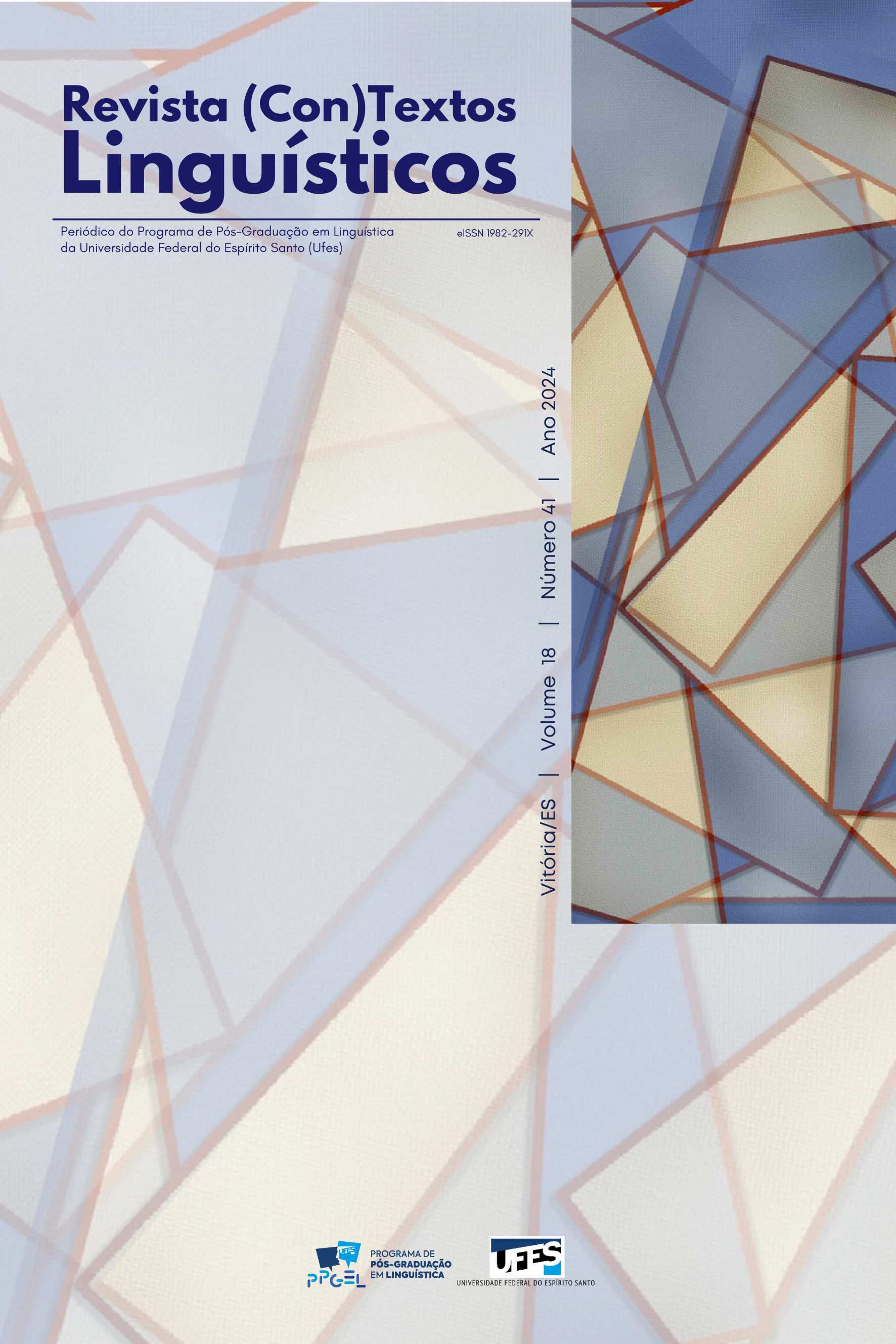Silence as a response in the corporate world
neological loanwords with the lexical unit ‘quiet’
DOI:
https://doi.org/10.47456/rctl.v18i41.45974Keywords:
English Loanwords in Portuguese, Neology, Compounds, Corporate DomainAbstract
This work aims to study some neological loanwords from English that are currently used in business domain in Portuguese. The units analyzed are compounds with the adjectival base ‘quiet’, which leads to formations with the structure ‘quiet-X’. In this structure, X is a noun that functions as the semantic core of the compound, as in ‘quiet vacation’ and ‘quiet ambition’. The theoretical framework is based on Pruvost and Sablayrolles (2003), Cabré (1993), Crystal (2003), Faraco (2001), Viana (2023), among others. The methodological procedures are guided by the principles conventionally adopted in Neology studies, which involve corpus collection, comparison with an exclusion corpus, detection and validation of neologisms, and the analysis of these units. The corpus is composed of journalistic texts dating from 2020 to 2024 and posts from the social network X. The detection of neologism candidates was done automatically by a Neologism Extractor, followed by manual validation. Semantically, the units analyzed reveal different meanings of the adjectival unit ‘quiet’ in the series of compounds; culturally, the units reflect the overvaluation of performance and productivity in the corporate world, through practices that reflect discontent among individuals in this group.
Downloads
References
ALBORNOZ, S. A educação dos educadores. São Paulo: Cortez, 2000.
ALVES, I. M. A integração dos neologismos por empréstimo ao léxico português. Alfa, São Paulo, v. 28 (supl.), p. 19–126, 1984.
ALVES, I. M. Neologismo: criação lexical. São Paulo: Ática, 2004.
ALVES, M. J.; TIMBANE, A. A. A dinâmica do português brasileiro na imprensa escrita: o caso de empréstimos e estrangeirismos lexicais. A Cor das Letras, v. 18, p. 8, 2017.
ANTUNES, R. O Privilégio da Servidão: o novo proletariado de serviços na era digital. São Paulo: Boitempo, 2019.
ANTUNES, R.; FILGUEIRAS, V. Plataformas digitais, Uberização do trabalho e regulação no Capitalismo contemporâneo. Contracampo, v. 39, n. 1, p. 27–43, 2020. Disponível em: https://periodicos.uff.br/contracampo/article/view/38901/pdf. Acesso em: 20 jul. 2024.
AUGER, P. Néologicité et extraction néologique automatisée. In: CABRÉ, M. T. et al. (ed.). Actes del I Congrés Internacional de Neologia de les Llengües Romàniques. Barcelona: IULA; Documenta Universitaria, 2010.
BRASIL. Lei nº 13.467, de 13 de julho de 2017. Altera a Consolidação das Leis do Trabalho (CLT). 2017. Disponível em: http://www.planalto.gov.br/ccivil_03/_ato20152018/2017/lei/l13467.htm. Acesso em: 20 jul. 2024.
CABRÉ, M. T. La terminología: teoría, metodología, aplicaciones. Barcelona: Editorial Antártida; Empúries, 1993.
CARVALHO, N. Empréstimos linguísticos na língua portuguesa. São Paulo: Cortez, 2009.
CRYSTAL, D. English as a global language. 2. ed. New York: Cambridge University Press, 2003.
DELLA FONTE, S. S. Formação no e para o trabalho. Educação Profissional e Tecnológica em Revista, v. 2, p. 6–19, 2018.
FARACO, C. A. Empréstimos e neologismos: uma breve visita histórica. Alfa: Revista de Linguística, São Paulo, v. 45, 2001.
GONÇALVES, C. A. V.; AFFONSO Jr., M. R. Das caipivodcas às caipitours: um estudo sobre o splinter caipi- à luz da Morfologia Construcional. In: SOLEDADE, J.; SIMÕES NETO, N. (org.). Morfologia Construcional: avanços em língua portuguesa. Salvador: EDUFBA, 2022, v. 1, p. 237–258.
GUILBERT, L. Théorie du néologisme. Cahiers de l'Association Internationale des Études Françaises, v. 25, p. 9–29, 1972.
HAN, B-C. Sociedade do cansaço. Petrópolis: Vozes, 2015.
HAN, B-C. Byung-Chul Han: “Hoje o indivíduo se explora e acredita que isso é realização”. [Entrevista concedida a] Carles Geli. El Pais, Barcelona, 2018. Disponível em: https://brasil.elpais.com/brasil/2018/02/07/cultura/1517989873_086219.html.
JESUS, A. M. R. Princípios metodológicos para a detecção de neologismos da comunicação digital. Estudos Linguísticos, São Paulo, v. 50, n. 1, 2021.
KUSSLER, L. M.; LEEUVEN, L. V. Da alienação em Marx à sociedade do cansaço em Han: fantasia e realidade dos trabalhadores precarizados. Cantareira, v. 34, p. 406–417, 2021.
LÉTURGIE, A. À propos de l’amalgamation lexicale en français. Langage, n. 183, p. 75–88, 2011.
MACHADO, L. Greve dos entregadores: o que querem os profissionais que fazem paralisação inédita. BBC Brasil, São Paulo, 1º de julho de 2020. Disponível em: https://www.bbc.com/portuguese/brasil-53124543. Acesso em: 20 set. 2020.
MARCUSE, H. Eros e civilização. Rio de Janeiro: LTC, 1999.
PRUVOST, J.; SABLAYROLLES, J-F. Les Néologismes. Que sais-je? 4. ed. Paris: 2019 [2003].
RODRIGUES, C. M. X. Empréstimos, estrangeirismos e suas medidas. Alfa, São Paulo, v.36, p. 99–109, 1992.
ROSSI, P. O nascimento da ciência moderna na Europa. Bauru: Edusc, 2001.
VIANA, M. S. A psicopolítica em Byung-Chul Han: introdução para a crítica das novas tecnologias-inovações de poder. Interseções, v. 53, p. 2–13, 2023.
VIEIRA, R. S. G.; SANTOS, R. M.; ALMEIDA, S. L. O Trabalho: tripalium ou uma busca por significados e realizações?. Cadernos GEPE, v. 1, p. 1–22, 2024.
XATARA, C. M. Estrangeirismos sem fronteira. Alfa, v. 45, p. 149–154, 2001.
Downloads
Published
Issue
Section
License
Copyright (c) 2024 Revista (Con)Textos Linguísticos

This work is licensed under a Creative Commons Attribution-NonCommercial 4.0 International License.
Authors assign the copyright of the article to the publisher of Revista (Con)Textos Linguísticos (Graduate Program in Linguistics, Ufes), if the submission is accepted for publication. Responsibility for the content of articles rests exclusively with their authors. The full or partial submission of the text already published in this periodical to any other periodical is prohibited.
This work is licensed under a Creative Commons Attribution-NonCommercial 4.0 International License.



